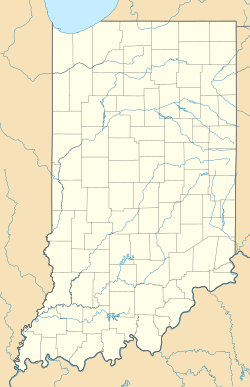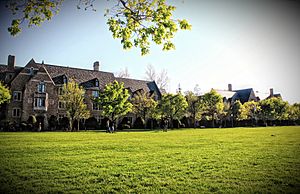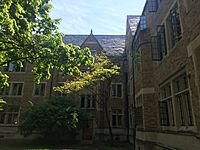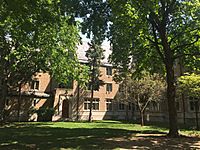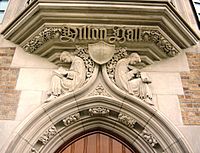Dillon Hall facts for kids
Quick facts for kids Dillon Hall |
|
|---|---|
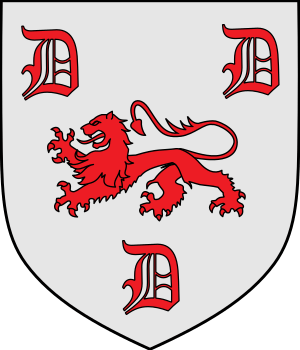
Blazon: Argent a lion passant between three Ds Gules.
|
|
| Campus quad | South |
| Established | 1931 |
| Named for | Patrick Dillon |
| Colors | Red and black |
| Gender | Male |
| Rector | Rev. Paul Doyle, C.S.C. |
| Undergraduates | 332 |
| Postgraduates | 2 (serving as Assistant Rectors) |
| Chapel | Saint Patrick |
| Mascot | Big Red |
| Interhall sports | Baseball, basketball, bowling, cross country, dodgeball, football, golf, hockey, lacrosse, racquetball, soccer, table tennis, tennis, volleyball |
| Charities | Hannah and Friends |
| Major events | Milkshake Mass, Stache Bash |
| Website | http://www.nd.edu/~dillon/ |
|
Dillon Hall
|
|
|
U.S. Historic district
Contributing property |
|
| Location | Notre Dame, Indiana |
| Built | 1931 |
| Architect | Maginnis and Walsh |
| Architectural style | Collegiate Gothic |
| Part of | University of Notre Dame: Main and South Quadrangles (ID78000053) |
| Added to NRHP | May 23, 1978 |
Dillon Hall is one of the many student homes at the University of Notre Dame. It is a dorm for male students. You can find it on campus, right next to Alumni Hall and the South Dining Hall.
Dillon Hall was built in 1931. It can house 334 undergraduate students. The building is named after Patrick Dillon, who was the second president of the university. The special shield, or "coat of arms," for Dillon Hall comes from the Dillon family. This historic building is also listed on the National Register of Historic Places.
Contents
Building Dillon Hall: A Look Back
Building Dillon Hall was part of a big plan. This plan started in the mid-1920s. The goal was to make student life better and add more places for students to live on campus.
Dillon and Alumni halls were planned to cost $850,000. They would add space for 500 students. This would help house more students on campus, bringing the total to 2,600. Construction began on March 2, 1931.
Who Designed Dillon Hall?
Dillon Hall was designed in 1931 by Charles Donagh Maginnis and Timothy Walsh. They were famous architects known for their Collegiate Gothic style. This style makes buildings look like old European colleges or churches.
The building uses local yellow brick with limestone decorations. You can see cool stone carvings on the outside and inside. These carvings show saints and athletes.
Special Statues and Chapel
Dillon Hall has four statues made by Rev. John J. Bednar.
- Two statues of St. Jerome and St. Augustine are in the west courtyard.
- A statue of Cardinal Newman is above the southwest entrance.
- A statue of St. Patrick is on the south wall.
There is also a statue of Commodore Barry in the west court. This one was made by Hungarian sculptor Eugene Kormendi.
Dillon's chapel is named after St. Patrick. This honors Patrick Dillon, who the hall is named after. There's also a small altar for St. Olaf. This honors Knute Rockne, a famous coach with Norwegian family, who passed away before the hall was finished.
Life in the New Dorm
When Dillon Hall opened in November 1931, it had some of the newest technology. This included electric elevators, phones in rooms, and even special slots for used razors.
The first leader, or "rector," of Dillon Hall was Rev. Patrick Haggerty.
Why "Platinum Coast"?
Dillon Hall was named after Father Patrick Dillon. He became the university's second president when he was only 33 years old in 1865. The hall was built 100 years after he was born.
Older dorms like Howard, Morrissey, and Lyons were called the "Gold Coast." This was because of their fancy design. Dillon and Alumni halls were even more modern. They were nicknamed the "Platinum Coast" because they had better features and a slightly grayer look.
During World War II, Dillon Hall helped train officers for the V-12 Navy College Training Program.
Past rectors of Dillon Hall include Mark L. Poorman and Daniel R. Jenky. Paul Doyle has been the rector since 1997.
Fun Traditions at Dillon Hall
Dillon Hall has some cool traditions that students love!
One big event used to be the Dillon Hall Pep Rally. This was a funny show held outside the dorm before the first home football game.
Now, Dillon's main event is "Opening Day." This is a wiffle ball tournament where different parts of the dorm play against each other. They also give out free food and have games in the courtyard.
Other fun events include "Milkshake Mass" and the "Big Red Dog Dance." This dance is held with Alumni Hall. Alumni Hall is also Dillon's traditional rival!
Gallery
 | Emma Amos |
 | Edward Mitchell Bannister |
 | Larry D. Alexander |
 | Ernie Barnes |


